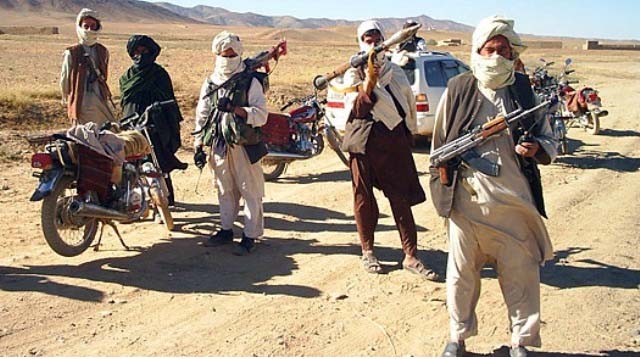According to reports, masked gunmen stormed four buses on a highway in Zabul province abducting a dozen people from a minority group. “The gunmen stopped buses and kidnapped passengers. No one has claimed responsibility for it. However, our investigations are under way,” the Zabul police chief Mirwais Noorzai is cited as saying. The kidnappers were said to speak local language.
It is believed that with the emergence of self-styled Islamic State of Iraq and Levant (ISIL) group, the sectarian violence have mounted to a great extent in Afghanistan. The Shia Muslims have frequently fell victim to the IS’s fundamental ideology. This month, seven Hazara, from Jaghori district of Ghazni province, were found dead in Zabul after being abducted in neighboring Ghazni province in February. They, including two women and a child, were beheaded with razor wire.
The killings sparked demonstrations nationwide, including in the capital Kabul, where tens of thousands of people demanded from the government to improve security across the country. The demonstrators expressed anger over the indiscriminate killing of seven innocent civilians. They accused the government of negligence, not only in this latest incident but in a series of horrific events since February 23, when 30 men were taken hostage by a group of fighters.
Nicholas Haysom, head of UNAMA, said, “The deliberate murder of civilian hostages, including women and children, is particularly abhorrent.”
Nadir Naim, an Afghan politician writes regarding the past abductees as, “This is not a homegrown incident; it was most likely carried out by non-Afghans. When the 19 Hazara hostages were finally released on May 11, I had the privilege of talking to some of them upon their return to Kabul. They told me that the people who held them captive were non-Afghans and could not speak any of our main languages, eg, Dari or Pashto. The hostages believed that they were of Uzbek origin.”
Condemning the ISIL and its recent attack in Paris, a former religious adviser to Osama bin Laden, Abu Hafs al-Mauritani has said that that ISIL has “misunderstood” Islam, just as people in the West might “misunderstand Christianity”. He is cited as saying, “Islam forbids the killing of innocent people, regardless of whether they are Muslims or non Muslims. Killing civilians and innocent people ... is unacceptable and has nothing to do with jihad.” He also accused ISIL’s recruitment methods, citing political and not religious grievances for the group’s rise.
Rejecting Baghdadi’s claim to be the leader of all Muslims, Mauritani says that ISIL fails to meet the conditions and requirements of a caliphate and is a “fruit” of the US-led occupation of Iraq.
Mauritani left al-Qaeda in August 2001 after disagreeing with bin Laden’s decision to target civilians.
Civilian casualty is a protracted challenge in Afghanistan which has a deep historical root. Similarly, during the Taliban’s regime Afghan nation was targeted indiscriminately and in case of war, the humanitarian law was violated flagrantly – without a national or international court to bring the perpetrators to justice. However, with the downfall of the Taliban’s regime, the ragtag militants were reorganized and embarked on terrorist attacks killing thousands of civilians and Afghan and foreign soldiers under a radical ideology. With the Taliban’s spring offensive and ISIL’s foothold in Afghanistan, the non-combatants are sacrificed more than ever before.
President Muhammad Ashraf Ghani has said that the Taliban and ISIL is a real threat for Afghanistan and for the region. “The Taliban is a real threat. This is not a national issue only for Afghans. Afghan and Pakistani Taliban have changed into a threat for South Asian countries,” he is quoted as saying. Pointing to recent insurgent attacks in Mali, Beirut, Istanbul and Paris, Ghani said the world is encountered with another type of insurgency – that of ISIL. He asserted, “The biggest threat we are faced with is from terrorists that launched attacks in Paris and Istanbul. We are experiencing the biggest type of threat in Afghanistan which is the new terrorist group (ISIL).”
It is self-explanatory that a spate of terrorist attacks around the world shows that it has changed into a global threat. Factually, the terrorists are a vehicle for political monsters who pursue their own interests behind the smoke-screen. In other words, the real players plan the geo-political wars to fish in the troubled water. Stoking sectarian violence in Afghanistan is utterly systematic and preplanned.
There seem mainly two reasons behind fueling sectarian tensions in Afghanistan: to dismantle the people of different ethnicity and therefore muddy the water in the country and secondly, to defame the National Unity Government (NUG) and channel the public mistrusts to Ghani’s administration. I believe that a real ideologue group will not target civilians, mainly women and children, without an iota of mercy and therefore, the perpetrators are no more than mercenary fighters who fight for financial interests.
Fueling sectarianism is a potential threat for Afghanistan and will provoke the public anger if the officials do not adopt effective measures to curb the issue. Besides economic and social challenges in NUG, insecurity is a major problem and civilian casualty has increased in the new administration. In addition, sectarian violence is a new phenomenon the militants have ushered in.
However, there is no clear strategy from the government to tackle this crisis. So, the government has to establish tight security on Afghan-Pak’s porous border and reinforce the Afghan soldiers to counter terrorism with high morale.

